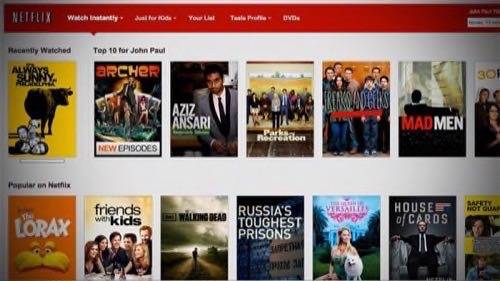
Netflix’s long-delayed integration with Facebook is here. This week, the company will roll out the option to customers in the U.S., where the archaic Video Privacy Act was recently amended to permit this type of feature. The integration is not as annoying as it could be, but I’m going to sit this one out.
First, the upside: It’s great that Netflix was able to get an outdated law changed to remove an illogical stumbling block to innovation. If only it was always so easy. And in theory, I see why showing me my friends’ recently-viewed movies could have some value. On a basic level, this feature makes sense.
(See also: Thanks Congress, But We Need Privacy Laws, Not More Social Sharing)
Netflix also deserves some credit for limiting the integration so that it doesn’t barf my entire viewing history onto Facebook by default. I have to explicitly tell Netflix that I’d like to be that obnoxious. Instead, it uses Facebook’s social graph to help recommend shows and movies within Netflix itself.
But do we need more frictionless sharing?
Here’s something nobody ever says: “I really love the way I can see everything my friends are listening to on Spotify via Facebook.” They might say, “My friend posted a YouTube video of this awesome new song” or “I noticed everybody was posting about this new album, so I checked it out.” There are a few problems with this model.
I Don’t Want To Share Everything
Not every detail is worthy of sharing, because not every detail is important. If I watch five minutes of a movie to see if I like it, it shouldn’t get the same social vote as my all-time favorites.
Netflix has much more valuable data than simply “John Paul watched Arrested Development.” It knows about my historical viewing habits, informed in part by ratings and preferences I’ve explicitly declared. That’s much more insightful than whether or not I clicked the play button. Hopefully these signals will find their way into Netflix’s social integration in time (if they’re not lurking under the hood already).
Sometimes we like to indulge in things that we wouldn’t necessarily tell the world about, just like I might occasionally blast “This is How We Do It” by Montell Jordan on Spotify in the middle of my workday when nobody’s around. (Now you know). On Netflix, you’ll be able to opt out of sharing on a video-by-video basis, which is smart.
But I still think sharing should be an opt-in experience, not an opt-out one. Something should be important enough for me to *want* to share it and then willingly expend the effort required to do so. I shouldn’t have to stop before playing each video and think, “Wait, do I want to *not* share this?” If we have to think a thought like that, we’re probably sharing way too much.
I’m Not The Only One Who Uses My Netflix Account
Chances are, you’re not the only person watching TV shows and movies on your Netflix account. I know I’m not. If my roommate is binging on Keeping Up With the Kardashians, do you really want me to auto-recommend shows to you?
A roommate is one thing, but what about an entire family? As Techcrunch’s Sarah Perez writes, anybody who connected to her via Facebook and Netflix is going to see a lot of Dora the Explorer, Tinker Bell and Sesame Street, because that’s what her young daughter likes to watch. The more crowded your household is, the less useful this data becomes.
Thankfully, Netflix is working on personalized profiles to help solve this problem, but they’re not ready yet. Until that feature launches, this one is going to be decidedly imperfect.
I Already Know What My Friends Like, Because We Talk To Each Other
With or without Facebook, television and movies are already an inherently social type of content: We watch them with friends and family and we talk about them in social gatherings. I already know what my friends like, because we’re human beings who, despite heroin-grade addictions to technology, still talk to each other face-to-face.
Seriously, I feel like I have a pretty good idea of the shows and movies that people I know like, with or without an algorithm. It’s entirely possible Netflix could dig up some gem via Facebook’s social graph, but if it’s worth watching, I’m sure I’ll come across it eventually. Besides, I don’t know about your queue, but mine is perpetually overloaded.
Doesn’t Facebook Already Know Enough About Us?
Companies like Facebook already know so much about us. Do we really need to funnel more data about our lives onto their servers?
I realize this is just an inevitable feature of our digital world and that I should suck it up. And usually, I do. Google knows even more about me than Facebook. I willingly hand over all that data, but it’s getting to the point where if divulging a new set of data about myself to some company isn’t going to add a significant and obvious value to my life, I’m going to skip it.
Of course, I’m already surrendering this information to Netflix by using their service in the first place. But my relationship with them is clear: I pay $8 per month and I get to stream whatever content they’re offering. They use data about me to improve the experience, and I happily keep shelling out that money.
With Facebook, it’s less clear. I joined without much thought eight years ago, am vaguely addicted to it and constantly wonder how much value I’m really getting out of the service. It weirds me out sometimes. I think about quitting.
It’s also still forging its business model. It won’t rely on subscription fees, but instead will find a way to turn that data about me into dollars. That’s fine, in theory, but I don’t know exactly how they’ll do it or if I trust them in general.

















